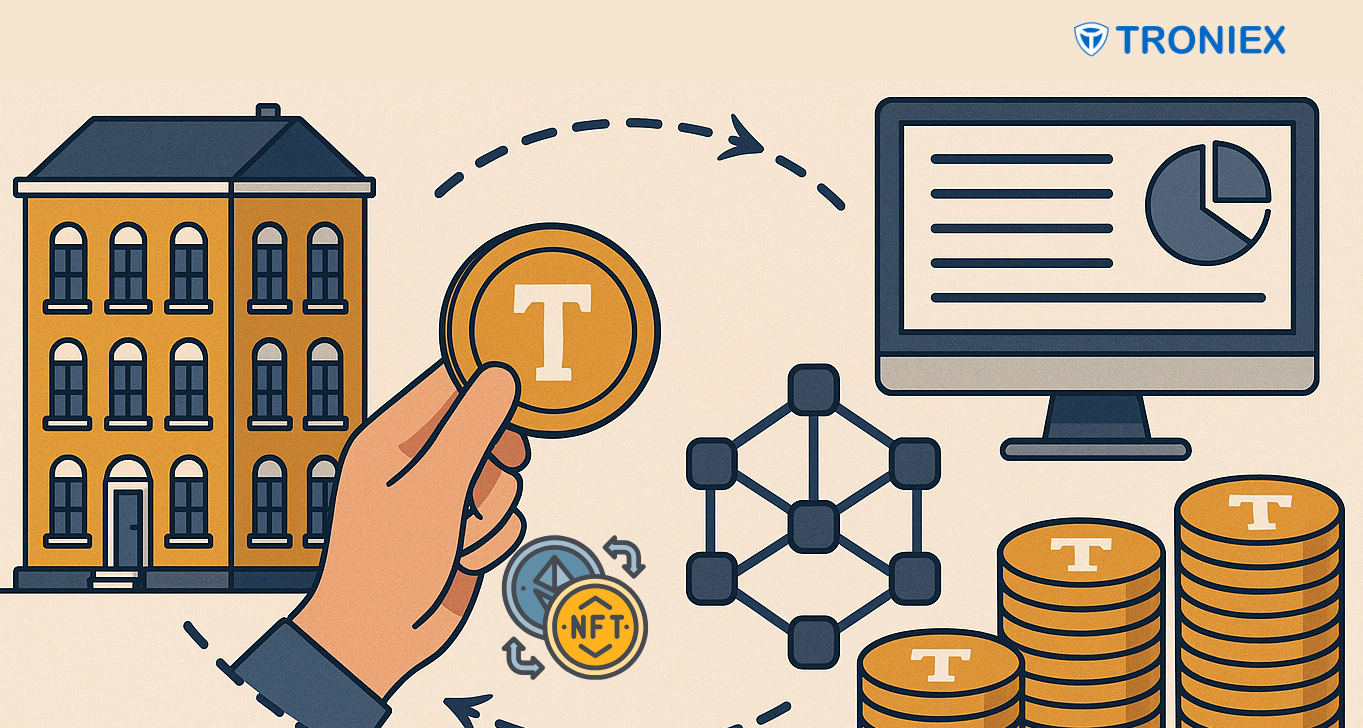Notifications
ALL BUSINESS
COMIDA
DIRECTORIES
ENTERTAINMENT
FINER THINGS
HEALTH
MARKETPLACE
MEMBER's ONLY
MONEY MATTER$
MOTIVATIONAL
NEWS & WEATHER
TECHNOLOGIA
TV NETWORKS
VIDEOS
VOTE USA 2026/2028
INVESTOR RELATIONS
DEV FOR 2025 / 2026
ALL BUSINESS
COMIDA
DIRECTORIES
ENTERTAINMENT
FINER THINGS
HEALTH
MARKETPLACE
MEMBER's ONLY
MONEY MATTER$
MOTIVATIONAL
NEWS & WEATHER
TECHNOLOGIA
TV NETWORKS
VIDEOS
VOTE USA 2026/2028
INVESTOR RELATIONS
DEV FOR 2025 / 2026
About Me
 saul bob
saul bob My name is Saulbob, and I’m a passionate writer with a focus on cryptocurrency, blockchain, and general content creation.
 saul bob -
8 hours ago -
Business -
crypto
bitcoin
blockchain
-
37 views -
0 Comments -
0 Likes -
0 Reviews
saul bob -
8 hours ago -
Business -
crypto
bitcoin
blockchain
-
37 views -
0 Comments -
0 Likes -
0 Reviews
The real estate sector, long known for its tradition and slow adoption of technology, is undergoing a significant transformation. Real estate tokenization, driven by blockchain technology, is emerging as a groundbreaking innovation, poised to disrupt how we invest in, buy, and sell property. By turning physical assets into digital tokens, tokenization democratizes real estate investing and brings unprecedented liquidity, transparency, and efficiency to the market. But how exactly does it work, and why should stakeholders in the industry pay attention?

Imagine being able to own a fraction of a luxury apartment in New York City, a villa in Bali, or a commercial space in London all without having to deal with banks, legal red tape, or massive upfront capital. That’s exactly what tokenization enables.
Through platforms like RealT, Propy, and Brickblock, retail investors now participate in property investments with as little as $100. These platforms tokenize real estate assets and sell digital shares (tokens) to investors. Each token represents a portion of the property’s equity and can generate rental income, appreciate in value, or be traded on secondary markets.
As someone who has invested through tokenized platforms, I’ve experienced the simplicity of using digital wallets, signing smart contracts, and receiving instant payouts. There’s no need for paperwork or intermediaries, just blockchain-enabled efficiency.
One of the most cited examples is RealT’s tokenized property in Detroit. This single-family rental home was divided into over 1,000 tokens, each valued at around $50. Token holders earned proportional rent income, distributed weekly through Ethereum-based stablecoins. The investment was transparent, fast, and efficient, demonstrating how tokenization makes previously inaccessible properties available to global investors.
At its core, tokenization involves creating a digital representation of a real-world asset on a blockchain. These tokens are issued via smart contracts, self-executing code that enforces ownership rules and transaction logic.
The process generally involves:
Legal Structuring: A property is placed into a legal entity (LLC or trust).
Token Issuance: The entity issues tokens on a blockchain, usually Ethereum or a compliant Layer 2 solution.
Compliance Controls: KYC (Know Your Customer), AML (Anti-Money Laundering), and SEC regulations are embedded into the platform.
Marketplace Listing: Tokens are listed on licensed platforms for public or private sale.
Revenue Distribution: Investors receive rent or dividends based on token ownership.
This framework brings automation and security to every transaction, ensuring that each token is verifiably backed by a real-world asset.
Liquidity: Traditionally illiquid real estate assets become tradable 24/7 on secondary markets.
Fractional Ownership: Lower capital barriers allow broader participation.
Global Access: Borders are no longer a limitation; anyone with internet and a wallet can invest.
Smart Contracts: Transactions are faster, cheaper, and free of human error.
These benefits make tokenization not only a technical advancement but also a financial and operational evolution.
Tokenization isn’t just for individual investors. Major institutions are jumping on board. In 2023, BlackRock CEO Larry Fink publicly praised tokenized assets for offering real-time settlement and reducing costs. Similarly, JPMorgan Chase has invested heavily in blockchain through its Onyx platform, which explores digital asset trading, including tokenized real estate.
Real estate investment trusts (REITs) and private equity firms are also exploring tokenization to enhance portfolio liquidity. For example:
RedSwan CRE tokenized over $2 billion worth of commercial real estate.
Harbor helped tokenize a $20 million student housing property in South Carolina.
These moves legitimize tokenization as more than a speculative trend—it’s becoming a trusted method of capital formation and asset management.
The regulatory environment is evolving in support of tokenized assets. The U.S. SEC, while cautious, has issued guidelines under Regulation D and Regulation A+ to support security tokens. In Europe, the MiCA (Markets in Crypto-Assets) framework is laying the groundwork for compliant tokenized asset markets.
This increasing regulatory clarity strengthens trust in the ecosystem and paves the way for broader adoption.
Despite its advantages, tokenization is not without risks:
Regulatory Uncertainty: Jurisdictions vary in how they classify and govern security tokens.
Technical Risks: Smart contract bugs or hacking could compromise investor assets.
Liquidity Illusions: Secondary markets are still maturing and may lack sufficient buyers.
Property Management: Tokens may represent property ownership, but someone still needs to maintain the physical asset.
These issues could impact returns and investor confidence if not properly managed.
Reputable tokenization platforms mitigate these risks with:
Audited Smart Contracts: Third-party code reviews ensure security.
Custodianship Services: Assets are held in regulated entities.
Insurance and Escrow: Coverage for potential losses or fraud.
Governance Tools: Token holders can vote on key decisions, enhancing transparency.
Moreover, blockchain’s inherent immutability ensures that every transaction is publicly verifiable, minimizing the risk of fraud or manipulation.
Tokenization is still in its early stages, but its potential is immense. Experts forecast that by 2030, up to 10% of global real estate assets could be tokenized, representing trillions of dollars in value.
We’re already seeing innovative use cases:
Tokenized Mortgages: Loans where repayment rights are sold via tokens.
Decentralized Real Estate DAOs: Communities collectively buying and managing properties.
Cross-border Crowdfunding: Pooling funds for international developments using crypto rails.
As blockchain technology matures and regulatory clarity improves, tokenization could become the new standard in real estate investing.
Real estate tokenization is not just a digital it’s a paradigm shift. It introduces efficiency, inclusivity, and liquidity into an industry traditionally bogged down by bureaucracy and high entry barriers. Through real-world applications, strong technical underpinnings, institutional endorsements, and transparent practices, tokenization has proven itself a credible and trustworthy innovation. For investors, developers, and policymakers alike, now is the time to understand, explore, and embrace this evolution. The future of real estate isn’t just physical it’s digital, decentralized, and driven by tokens.
